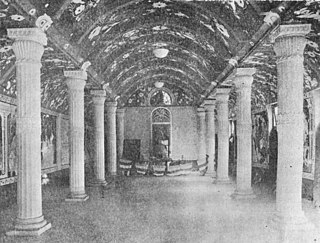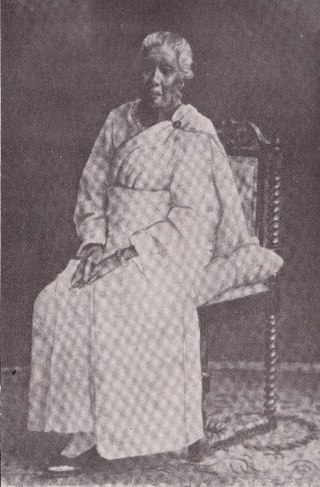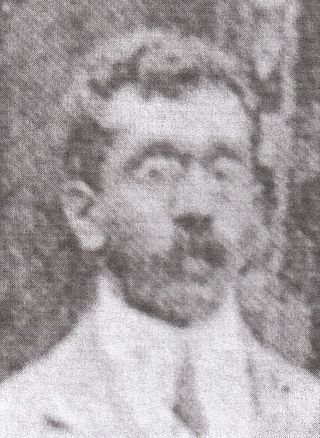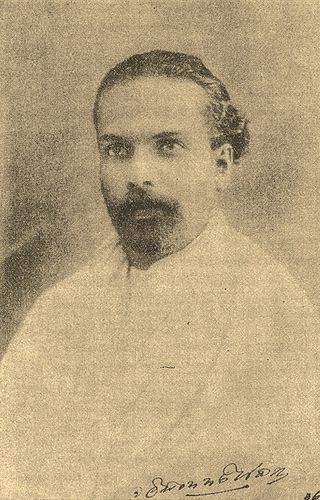
Anagārika Dharmapāla was a Sri Lankan Buddhist revivalist and a writer.

The Maha Bodhi Society is a South Asian Buddhist society presently based in Kolkata, India. Founded by the Sri Lankan Buddhist leader Anagarika Dharmapala and the British journalist and poet Sir Edwin Arnold, its first office was in Bodh Gaya. The organization's efforts began in order to resuscitate Buddhism in India, and to restore the ancient Buddhist shrines at Bodh Gaya, Sarnath and Kushinara. The restoration and revival of the glory and sanctity of Bodh Gaya are also aims of Maha Bodhi Society.

The Buddhist flag is a flag designed in the late 19th century as a universal symbol of Buddhism. It is used by Buddhists throughout the world.

The Sri Lankan independence movement was a peaceful political movement which was aimed at achieving independence and self-rule for the country of Sri Lanka, then British Ceylon, from the British Empire. The switch of powers was generally known as peaceful transfer of power from the British administration to Ceylon representatives, a phrase that implies considerable continuity with a colonial era that lasted 400 years. It was initiated around the turn of the 20th century and led mostly by the educated middle class. It succeeded when, on 4 February 1948, Ceylon was granted independence as the Dominion of Ceylon. Dominion status within the British Commonwealth was retained for the next 24 years until 22 May 1972 when it became a republic and was renamed the Republic of Sri Lanka.
Sir Herbert Layard Dowbiggin was the eighth British colonial Inspector General of Police of Ceylon from 1913 to 1937, the longest tenure of office of an Inspector General of Police (IGP). He was called the 'Father of Colonial Police'. He was knighted in 1931.
Rajagiriya is a part of the Sri Lanka's administrative capital of Sri Jayawardenapura. A fairly large suburb bordering Colombo, Rajagiriya lies between Borella and Ethul Kotte, straddling Parliament Road.

National Hero is a status an individual can receive in Sri Lanka for those who are considered to have played a major role in fighting for the freedom of the country. The status is conferred by the President of Sri Lanka. The recipients of the award are celebrated on a Sri Lankan national holiday, National Heroes’ Day, held annually on 22 May. Every year, the President and general public pay tribute by observing a two minutes silence in their memory. The individuals are also celebrated on Sri Lanka Independence Day, held on 4 February. In this, the President or Prime Minister will typically address the nation with a speech honouring the National Heroes. The award has only been awarded to Sri Lankan citizens, but is not limited to this group.

Don Carolis Hewavitharane Wijeyaguneratne (Sinhala: දොන් කරෝලිස් හේවාවිතාරණ)(1833 – 18 February 1906) was a Ceylonese businessman, industrialist, philanthropist and a pioneer of the Buddhist revival movement. He was the father of Anagarika Dharmapala, and founded a family of considerable influence.

Muhandiram Lansage Andiris Perera Dharmagunawardhana was a Sri Lankan[Sinhala Buddhist] businessman, a philanthropist, and a pioneer of the Buddhist revival movement. He was the grandfather of Anagarika Dharmapala.

Charles Alwis Hewavitharana, FRCS, LRCP was a Ceylonese (Sinhalese) physician who played a significant role in Sri Lanka's Independence and Buddhist Revival movements. He was the brother of Anagarika Dharmapala.

Mangala Nath Moonesinghe was a Sri Lankan lawyer and politician. He served as a Member of Parliament for Bulathsinhala electorate between 1965 and 1977, and the Kalutara electorate between 1989 and 1994. He was Sri Lankan High Commissioner to the United Kingdom from 2000 to 2002 and Sri Lankan High Commissioner to India from 1995 to 2000.
Susil Moonesinghe was a Sri Lankan lawyer, politician, diplomat and former chairman of State Trading Wholesale Company Ltd. A former chief minister of the Western Provincial Council and a member of parliament, he was Sri Lankan Ambassador to Iran. The brother of Anil Moonesinghe and the son of Piyadas Moonesinghe, he was educated at the Royal College, Colombo.

Alexander Ekanayake Gunasinha trade unionist and politician. A pioneering trade union leader, known as the "Father of the Labour Movement", he was the founder of the Ceylon Labour Party, Sri Lanka's first labour organisation. A former mayor of Colombo, he served as the Minister without portfolio, Minister of State and Chief Government Whip in the First Parliament of Sri Lanka and Ceylon's Ambassador to Burma and Indonesia.

Brahmachari Walisinghe Harischandra was a social reformer, historian, author and revivalist of Sri Lankan Buddhism. He was a follower of Anagarika Dharmapala, who gave leadership to the Buddhist revivalist movement, after the lead given by Colonel Henry Steel Olcott. Walisinghe Harischandra is also regarded as the saviour of the citadel of Buddhism in Sri Lanka, Anuradhapura.
The 1915 Sinhalese-Muslim riots was a widespread and prolonged ethnic riot in the island of Ceylon between Sinhalese Buddhists and the Ceylon Moors. The riots were eventually suppressed by the British colonial authorities.
Colonel Henry Huntly Leith Malcolm was a Scottish officer in the British Army during the Anglo-Egyptian War and World War I.

Anagarika Dharmapala Srimathano is a 2015 Sri Lankan Sinhala biographical history film directed by Sanath Abeysekara and co-produced by Ven. Banagala Upatissa Thera and Sunil T. Fernando for Sunil T. Films. It stars Palitha Silva in lead role along with Lucky Dias and Sriyantha Mendis. Music composed by Rohana Weerasinghe. It is the 1211th Sri Lankan film in the Sinhala cinema.

Piyadasa Sirisena was a Ceylonese pioneer novelist, patriot, journalist, temperance worker and independence activist. He was the author of some of the bestselling Sinhalese novels in early 20th century. A follower of Anagarika Dharmapala, Siresena was the most popular novelist of the era and most of his novels were on nationalistic and patriotic themes. Piyadasa Sirisena used the novel as a medium through which to reform society and became one of the leaders in mass communication in the early part of the 20th century. Piyadasa Sirisena is widely considered as the father of Sinhalese novel. Some of his novel were reprinted even in the 21st century.
Neil Kamal Hewavitarne was a Ceylonese businessman and politician.
Rajasinghe Hewavitarne, was a Ceylonese businessman and politician.













